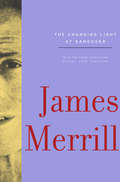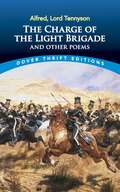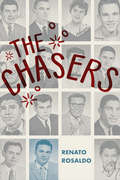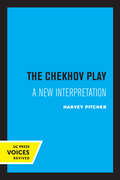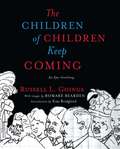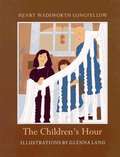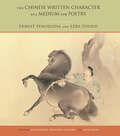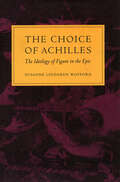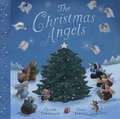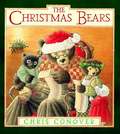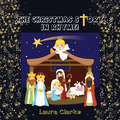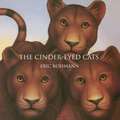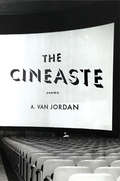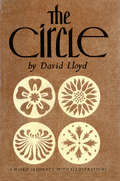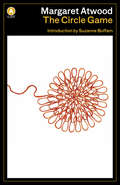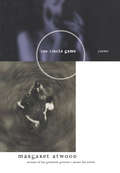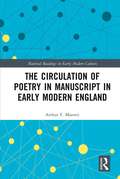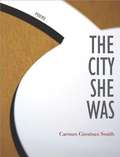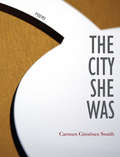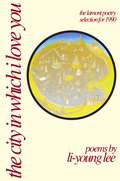- Table View
- List View
The Changing Light at Sandover: A Poem
by James MerrillJames Merrill&’s audacious and dazzling epic poem, The Changing Light at Sandover, remains as startling today as when it first emerged in separate volumes over a period of several years. Individual parts won the Pulitzer Prize and the National Book Award, and the entire poem, when it was collected into one volume in 1982, won the National Book Critics Circle Award. It is now an American classic, here in a definitive new hardcover edition that includes Voices from Sandover, Merrill&’s recasting of the poem for the stage. The book carries us to the scene of Merrill&’s Ouija board sessions with his partner, David Jackson—the candlelit Stonington dining room with its flame-colored walls and the famous Willowware cup they used as a pointer in their occult travels. In a shimmering interplay of verse forms, Merrill set down their extended conversations with their familiar and guide, Ephraim (a first-century Greek Jew), W. H. Auden, W. B. Yeats, Plato, a brilliant peacock named Mirabell, and other old friends who had passed to the other side. JM (whom the spirits call &“scribe&”) and DJ (&“hand&”) are also introduced to the lonely eminence God B (&“God Biology&”), his sister Mother Nature, and a host of angels and lesser residents of the empyrean who are variously involved in the ways of this world.The laughter, the missteps, and the schoolroom frustrations of the earthly pair&’s gradual enlightenment make this otherworldly journey, finally, and utterly human one. A unique exploration of the writer&’s role in a postatomic, postreligious age, Sandover has been compared to the work of Yeats, Proust, Milton, and Blake. Merrill&’s tale of the joys and tragedies of man&’s powers, and his message about the importance of our endangered efforts to make a good life on earth, will stand as one of the most profound experiences available to readers of poetry.
The Charge of the Light Brigade and Other Poems: And Other Poems (Dover Thrift Editions: Poetry)
by Alfred, Lord TennysonConsidered by Victorians as the finest contemporary poet, Alfred, Lord Tennyson (1809–1892) gained much critical favor for his mastery of poetic technique, high-mindedness, and superb natural description. This volume contains a representative selection of his best works, including the famous long narrative poem "Enoch Arden," as well as a number of important lyrics, monologues, ballads, and other typical pieces. Among these are "The Lady of Shalott," "The Beggar Maid," "The Charge of the Light Brigade," "Break, break, break," "Flower in the Crannied Wall," and "Ode on the Death of the Duke of Wellington." Also here are carefully chosen, uncut excerpts from three longer works: The Princess, "Maud," and "The Brook." With this inexpensive volume at their fingertips, students and lovers of poetry can enjoy a substantial sampling of Tennyson's still-admired, widely quoted verse.
The Chasers
by Renato RosaldoRenato Rosaldo's new prose poetry collection shares his experiences and those of his group of twelve Mexican American Tucson High School friends known as the Chasers as they grew up, graduated, and fell out of touch. Derived from interviews with the Chasers and three other friends conducted after their fiftieth high school reunion, Rosaldo's poems present a chorus of distinct voices and perspectives that convey the realities of Chicano life on the borderlands from the 1950s to the present.
The Chekhov Play: A New Interpretation
by Harvey PitcherThis title is part of UC Press's Voices Revived program, which commemorates University of California Press’s mission to seek out and cultivate the brightest minds and give them voice, reach, and impact. Drawing on a backlist dating to 1893, Voices Revived makes high-quality, peer-reviewed scholarship accessible once again using print-on-demand technology. This title was originally published in 1985.
The Children of Children Keep Coming
by Kim Bridgford Russell L GoingsThe Children of Children Keep Coming is an awe-inspiring contribution to literature. A breathtaking form of poetic expression, this unique work presents a riveting chronicle of the African American experience in the United States. The dramatic odyssey opens with two anonymous slaves running to catch the Freedom Train, where at journey's end they hope to find liberation. Along the way, they encounter fields of laborers sowing seeds, plodding hard under sun high and moon low, working to end slavery. The toilers are sustained by work songs that at one moment express the dreams and fears of the downtrodden and at another moment burst forth with unbound faith and optimism. These determined travelers, with dangerous crows circling around them, roam through fields holding their dead; step over graves of the once enslaved; walk across beds of red, white, and blue flowers, all for the opportunity to march on the green lawns of democracy. Throughout their entangled journey, they meet imaginary and mythological characters. But it is down by the riverside where their belief that a time of change will come is affirmed by engagements with "giants" such as Frederick Douglass, Billie Holiday, Hank Aaron, Sojourner Truth, and Rosa Parks. The Children of Children Keep Coming is strung seamlessly together -- by poetry and prose, blues and gospel, hymns and jazz, work songs and prayers -- forcing the universal harmony of the cry for freedom and justice to reach an unforgettable pitch that cannot be ignored. This astounding mosaic of voices is accentuated by the images of Romare Bearden.
The Children's Hour
by Henry Wadsworth Longfellow"Between the dark and the daylight, When the night is beginning to lower, Comes a pause in the day's occupation, That is known as the children's hour. ..." Other books by this author are available in this library.
The Chinese Written Character as a Medium for Poetry: A Critical Edition
by Jonathan Stalling Ernest Fenollosa Ezra Pound Lucas KleinFirst published in 1919 by Ezra Pound, Ernest Fenollosa’s essay on the Chinese written language has become one of the most often quoted statements in the history of American poetics. As edited by Pound, it presents a powerful conception of language that continues to shape our poetic and stylistic preferences: the idea that poems consist primarily of images; the idea that the sentence form with active verb mirrors relations of natural force. But previous editions of the essay represent Pound’s understanding—it is fair to say, his appropriation—of the text. Fenollosa’s manuscripts, in the Beinecke Library of Yale University, allow us to see this essay in a different light, as a document of early, sustained cultural interchange between North Americaand East Asia.Pound’s editing of the essay obscured two important features, here restored to view: Fenollosa’s encounter with Tendai Buddhism and Buddhist ontology, and his concern with the dimension of sound in Chinese poetry.This book is the definitive critical edition of Fenollosa’s important work. After a substantial Introduction, the text as edited by Pound is presented, together with his notes and plates. At the heart of the edition is the first full publication of the essay as Fenollosa wrote it, accompanied by the many diagrams, characters, and notes Fenollosa (and Pound) scrawled on the verso pages. Pound’s deletions, insertions, and alterations to Fenollosa’s sometimes ornate prose are meticulously captured, enabling readers to follow the quasi-dialogue between Fenollosa and his posthumous editor. Earlier drafts and related talks reveal the developmentof Fenollosa’s ideas about culture, poetry, and translation. Copious multilingual annotation is an important feature of the edition.This masterfully edited book will be an essential resource for scholars and poets and a starting point for a renewed discussion of the multiple sources of American modernist poetry.
The Choice of Achilles
by Susanne Lindgren WoffordThis book examines the ways that Classical and Renaissance epic poems often work against their expressed moral and political values. It combines a formal and tropological analysis that stresses difference and disjunction with a political analysis of the epic's figurative economy. It offers an interpretation of three epic poems - Homer's Iliad, Virgil's Aeneid, and Spencer's Faerie Queene - that focuses on the way these texts make apparent the aesthetic, moral, and political difference that constitutes them, and sketches, in conclusion, two alternative resolutions of such division in Milton's Paradise Lost and Cervantes' Don Quixote, an 'epic' in prose. The book outlines a theory of how and why epic narrative may be said to subvert certain of its constitutive claims while articulating a cultural argument of which it becomes the contradictory paradigm. The author focuses on the aesthetic and ideological work accomplished by poetic figure in these narratives, and understands ideology as a figurative, substitutive system that resembles and uses the system of tropes. She defines the ideological function of tropes in narrative and the often contradictory way in which narratives acknowledge and seek to efface the transformative functions of ideology. Beginning with what it describes as a dual tendency within the epic simile (toward metaphor in the transformations of ideology; toward metonymy as it maintains a structure of difference), the book defines the politics of the simile in epic narrative and identifies metalepsis as the defining trope of ideology. It demonstrates the political and poetic costs of the structural reliance of allegorical narrative on catachresis and shows how the narrator's use of prosopopoeia to assert political authority reshapes the figurative economy of the epic. The book is particularly innovative in being the first to apply to the epic the set of questions posed by the linking of the theory of rhetoric and the theory of ideology. It argues that historical pressures on a text are often best seen as a dialectic in which ideology shapes poetic process while poetry counters, resists, figures, or generates the tropes of ideology itself.
The Christmas Angels
by Claire FreedmanHush now, can you hear the angels singing? Sweetest songs of peace from heaven above, Christmas songs of hope and joy and wonder, Filling every happy heart with love. It's Christmas! As we count the days until that happy celebration, the angels share our special times of gladness, from blessing the falling snow to lighting up the starry sky.
The Christmas Bears
by Chris ConoverSanta Bear's seven cubs watch as their father loads the sleigh with toys to deliver on Christmas Eve.
The Christmas Story - In Rhyme!
by Laura ClarkeChildren will delight in this beautifully written retelling of the Christmas nativity story. Filled with stunning illustrations and written in engaging rhyming text, this book will become a cherished favourite, perfect for bedtime or sharing with others. Bringing the story of Jesus’ birth to life, it’s ideal for reading at churches, community gatherings, nursing homes, and Sunday school performances. From the divine visit of the angel Gabriel to Mary, to the birth of Jesus, the journey of the shepherds and the wise men, King Herod’s fury upon discovering that the ‘King of the Jews’ had been born, and the final exodus of Joseph, Mary, and Jesus to Egypt. This timeless story will captivate the imagination of any child.
The Christmas Tree Tangle
by Margaret MahyOne animal after another tries to rescue the kitten, but all of them get stuck! Who will help? Other books by Margaret Mahy are available in this library.
The Cinder-Eyed Cats
by Eric RohmannFrom the creator of the Caldecott Honor winner Time Flies, here’s a little boy’s journey to a tropical dream world. Magnificent oil paintings and rhyming text bring to life a mysterious island where cinder-eyed cats move like shadows, boats float above the ocean, whales fly across the dawn sky, and a parade of fish dances in the light of a campfire.
The Cineaste: Poems
by A. Van Jordan"Finds evocative new ways to connect us to a shared storytelling heritage."--Entertainment Weekly A. Van Jordan, an acclaimed American poet and the author of three previous volumes, "demonstrates poetry's power to be at once intimate and wide-ranging" (Robert Pinsky, Washington Post Book World). In this penetrating new work he takes us with him to the movies, where history reverberates and characters are larger than life. The Cineaste is an entrancing montage of poems, wherein film serves as the setting for contemplative trances, memoir, and pure fantasy. At its center is a sonnet sequence that imagines the struggle of pioneer filmmaker Oscar Micheaux against D. W. Griffith's The Birth of a Nation, which Micheaux saw not only as racist but also as the start of a powerful new art form. "Sharpen the focus in your lens, and you / Sharpen your view of the world; you can see / How people inhabit space in their lives, / How the skin of Negroes and whites both play / With light." Scenes and characters from films such as Metropolis, Stranger than Paradise, Last Year at Marienbad, The Red Shoes, and The Great Train Robbery also come to luminous life in this vibrant new collection. The Cineaste is an extended riff on Jordan's life as a moviegoer and a brilliant exploration of film, poetry, race, and the elusiveness of reverie. from "Last Year at Marienbad" A place, though visible, is like a ghost of memories. Even memories one forgets linger in the space in which they occurred. Here within the expanse of vaulted ceilings, doorways leading to more doors, hallways leading to more halls, the faintest recollections absorb over time; no act will wholly evanesce.
The Circle
by David LloydDavid Lloyd's verses are a genuine contribution to the literature of haiku. They capture an image, a moment in time, and engrave it in the memory for all time.
The Circle Game (A List)
by Margaret AtwoodThe appearance of Margaret Atwood's first major collection of poetry marked the beginning of a truly outstanding career in Canadian and international letters. The voice in these poems is as witty, vulnerable, direct, and incisive as we've come to know in later works, such as Power Politics, Bodily Harm, and Alias Grace. Atwood writes compassionately about the risks of love in a technological age, and the quest for identity in a universe that cannot quite be trusted. Containing many of Atwood's best and most famous poems, The Circle Game won the 1966 Governor General's Award for Poetry and rapidly attained an international reputation as a classic of modern poetry.
The Circle Game (A List)
by Margaret AtwoodThe appearance of Margaret Atwood's first major collection of poetry marked the beginning of a truly outstanding career in Canadian and international letters. The voice in these poems is as witty, vulnerable, direct, and incisive as we've come to know in later works, such as Power Politics, Bodily Harm, and Alias Grace. Atwood writes compassionately about the risks of love in a technological age, and the quest for identity in a universe that cannot quite be trusted. Containing many of Atwood's best and most famous poems, The Circle Game won the 1966 Governor General's Award for Poetry and rapidly attained an international reputation as a classic of modern poetry. This beautiful edition of The Circle Game contains the complete collection, with an introduction by Sherrill E. Grace of the University of British Columbia.
The Circulation of Poetry in Manuscript in Early Modern England (Material Readings in Early Modern Culture)
by Arthur F. MarottiThis study examines the transmission and compilation of poetic texts through manuscripts from the late-Elizabethan era through the mid-seventeenth century, paying attention to the distinctive material, social, and literary features of these documents. The study has two main focuses: the first, the particular social environments in which texts were compiled and, second, the presence within this system of a large body of (usually anonymous) rare or unique poems. Manuscripts from aristocratic, academic, and urban professional environments are examined in separate chapters that highlight particular collections. Two chapters consider the social networking within the university and London that facilitated the transmission within these environments and between them. Although the topic is addressed throughout the study, the place of rare or unique poems in manuscript collections is at the center of the final three chapters. The book as a whole argues that scholars need to pay more attention to the social life of texts in the period and to little-known or unknown rare or unique poems that represent a field of writing broader than that defined in a literary history based mainly on the products of print culture.
The City She Was
by Carmen Giminez Smith"When you open this book, expect serious role-playing and syntactic tap dancing. The City She Was presents a world that brings 'the horizon line into your lexicon' and a poet's muse ('The Endangered You') is lent to a friend and returned 'a little more frayed.' Giménez Smith muddles and enchants with her many masks, leaving the ground a little less stable under our feet." -Matthea Harvey, author of Modern Life, Sad Little Breathing Machine, and Pity the Bathtub Its Forced Embrace of the Human Form
The City She Was (Mountain West Poetry Series)
by Carmen Giménez Smith Carmen Giménez SmithMountain West Poetry Series Published by the Center for Literary Publishing at Colorado State University
The City in Which I Love You
by Li-Young LeeContentsI.Furious VersionisII.The InterrogationThis Hour And What Is DeadArise, Go DownMy Father, In Heaven, Is Reading Out LoudFor A New Citizen Of These United StatesWith RuinsIII.This Room And Everything In ItThe City In Which I Love YouIV.The WaitingA StoryGoodnightYou Must SingHere I AmA Final ThingV.The Cleaving
